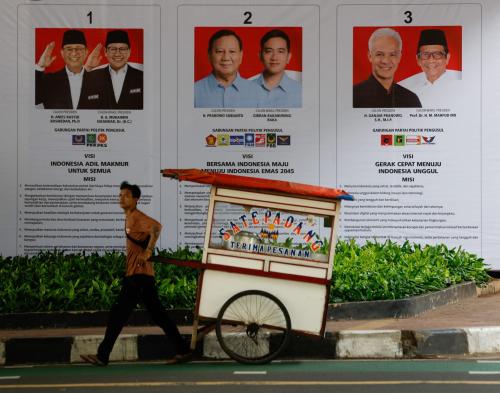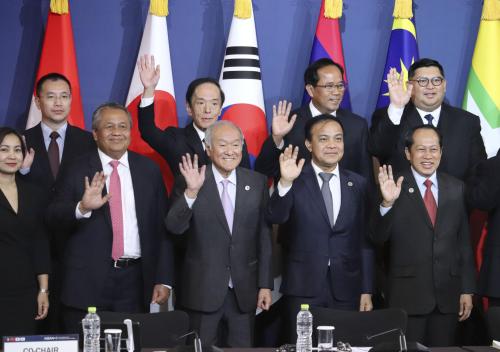On Valentine’s Day, Indonesia held the world’s largest single-day election to choose a new president, vice president, parliament, and local representatives. In this so-called “festival of democracy,” Indonesian voters showed their love for Prabowo Subianto, the current defense minister and three-time presidential candidate, with roughly 58 percent of the votes. Prabowo will take over as president from Joko Widodo who has exhausted the two terms allowed under the constitution.
Born into an elite and cosmopolitan family, the incoming president spent his childhood and high school education in Singapore, Malaysia, Hong Kong, Switzerland, and England. Back in Indonesia, Prabowo joined the notorious army special forces unit (Kopassus) and married one of President Suharto’s daughters, allowing him to rise quickly through the ranks of the military and keeping him close to centers of power.
After Suharto’s fall, Prabowo was discharged from the armed forces in 1998 for alleged human rights violations, and he spent the next two decades trying to consolidate his place in post-Suharto politics. After two failed attempts in 2014 and 2019 to become president, the former general will finally assume the top job in October.
Kingmaker Jokowi
That said, the current president, also known as Jokowi, is not yet done. His deft maneuvering before, during, and after the election shows he has every intention of shaping the terrain of Indonesian politics, even in the final months of his decade-long tenure.
Jokowi’s popularity has been key. Despite his critics, the president has been a much-loved figure in the country, with a roughly 80 percent approval rating, with an average of around 70-75 percent over 2023. His track record of fulfilling his pre-2014 election promises of making life better for Indonesians has provided him extraordinary legitimacy. This includes improving health and education services for the lower socioeconomic classes; augmenting connectivity through roads, ports, and airports; and removing red tape to facilitate investment.
After floating a constitutional change that would have allowed him to run for a third term or even delayed the election (both ideas were struck down by political elites), Jokowi leveraged his popularity to shape an electoral outcome he believed would best serve his political legacy, which includes a continuation of his infrastructure upgrades and moving the Indonesian capital.
The president signaled in several ways to his supporters whom they should vote for. First, owing to a falling out between Jokowi and his party, he shifted his tacit support for his party’s candidate and the governor of Central Java, Ganjar Pranowo, who had been leading in the polls, to his former two-time rival, Prabowo. This blunted Ganjar’s claims that he was Jokowi’s heir. The other candidate, the governor of Jakarta, Anies Baswedan, ran on a platform based on change to a populous with little appetite to shift from the status quo.
Second, Jokowi offered his eldest son, 36-year-old Gibran Rakabuming Raka, as Prabowo’s vice presidential running mate after a controversial decision by the Constitutional Court, presided over by the president’s brother-in-law, which permitted Gibran to run despite failing to meet the minimum age of 40. Jokowi’s youngest son, Kaesang Pangarep, was also made chair of the Indonesian Solidarity Party (PSI) just two days after becoming a member. PSI then joined Prabowo’s coalition—although PSI did not garner enough votes to have seats in the parliament.
Third, the president distributed social assistance during the election to encourage votes for his chosen successor, exchanging his popularity for the Prabowo ticket. After Gibran was named Prabowo’s running mate, Jokowi personally handed out sacks of rice in areas not far from posters showing his favored pair while, ahead of the election, his government announced the extension of current programs or new ones handing out cash and non-cash assistance. Indonesia’s Tempo magazine deemed the use of taxpayers’ money in this way as “political corruption.”
While Prabowo already had a modest lead during 2023 opinion polls, his popularity climbed above 50 percent since October, arguably further buoyed by Jokowi’s efforts and desire for the election to be done in a single round.
Since the election, Jokowi has shown no signs of stopping. In February, he appointed Agus Harimurti Yudhoyono, the son of former President Susilo Bambang Yudhoyono, as minister for agrarian affairs and spatial planning. In doing so, he brought one of the only two opposition parties into his coalition, further consolidating an even more cooperative parliament.
Prabowo, Indonesians, and the international community
While Jokowi leaves behind, in theory, a more permissive political environment for his successor to keep furthering his agenda, he also leaves a legacy of democratic backsliding. While some of this is attributable to structural issues, Jokowi’s policies have led to tighter controls on the media, the erosion of women’s reproductive rights and workers’ rights, a weakening of the Corruption Eradication Commission, and greater domestic security and non-security responsibilities for the military.
While Prabowo will benefit from this environment, the “coat-tails effect” of Jokowi’s popularity and legitimacy can only last so long. The new president will need to have some early successes, particularly among the youth, with over half of Indonesia’s 204 million voters under the age of 40 voting in the recent election. Keen to see a continuation of Jokowi-era progress, those young voters will be looking for improved employment prospects and vocational education, greater attention to environmental issues as well as greater accountability and less corruption. With social media providing a major source of information (and disinformation), according to one analyst, younger Indonesians can access greater information about political performance, keeping leaders accountable.
Also high on Prabowo’s agenda will be continuing to attract foreign direct investment (FDI), especially from China, to finance major infrastructure projects; the construction of the new capital, Nusantara; and further development of the country’s burgeoning nickel industry. While China has played a critical role in enabling Indonesia’s climb up the value chain with onshore nickel processing, Jakarta will need to diversify its investment sources to mitigate against dependency on Beijing over the long term and search for sources of green investment. This could come from increased cooperation within the Association of Southeast Asian Nations (ASEAN), particularly with Singapore or Vietnam, or, should its bid for membership in the Organization for Economic Cooperation and Development be successful, other industrialized economies like France, Japan, South Korea, the U.K., and the United States.
Prabowo will face pressure to show progress on another key Jokowi policy: the Indonesia Emas or Golden Indonesia 2045 Vision, which aims for Indonesia to transform into an industrialized economy by the nation’s centenary. Again, there are opportunities for a variety of investors in the archipelagic nation’s future.
While, according to one analyst, there is a tacit understanding in the country to not let FDI be impacted by corruption, it is ultimately in the government’s favor to maintain Indonesia’s global investment rankings. Thus, an ideal future for the incoming leader will be one in which elites’ power is protected but the investment climate remains favorable.
Aside from trade, Indonesia under Prabowo will continue to be a nonaligned state, balancing its relations with all great and emerging powers. Pragmatism dictates that Prabowo will maintain steady ties with both Beijing and Washington. Indonesia’s military has been a willing security partner of all states, particularly Indo-Pacific ones with advanced capabilities. As such, Indo-Pacific security actors should be prepared to build on existing defense cooperation and military engagement activities as well as encourage Indonesia’s ability to lead greater intra-ASEAN capacity in humanitarian assistance. That is an area where civilian agencies and defense forces in Australia, Japan, and the United States have key roles to play.
The future looks bright for Indonesia in many ways; the country has maintained high levels of economic growth, even during the pandemic, and has a youthful population full of creativity and resilience, abundant natural resources, and geostrategic circumstances that render it an essential regional player.
But behind this hope, there are questions about the legacies of this era. Jokowi has done much for the country, which he leaves now in Prabowo’s hands, but has also unwound many of the hard-won gains of the Reformasi era. Will Prabowo deliver on Jokowi’s promises or take the country in a different direction? Only time will tell.
The Brookings Institution is committed to quality, independence, and impact.
We are supported by a diverse array of funders. In line with our values and policies, each Brookings publication represents the sole views of its author(s).








Commentary
Indonesia’s eras: Reflections on Jokowi’s legacy and Prabowo’s presidency
February 28, 2024